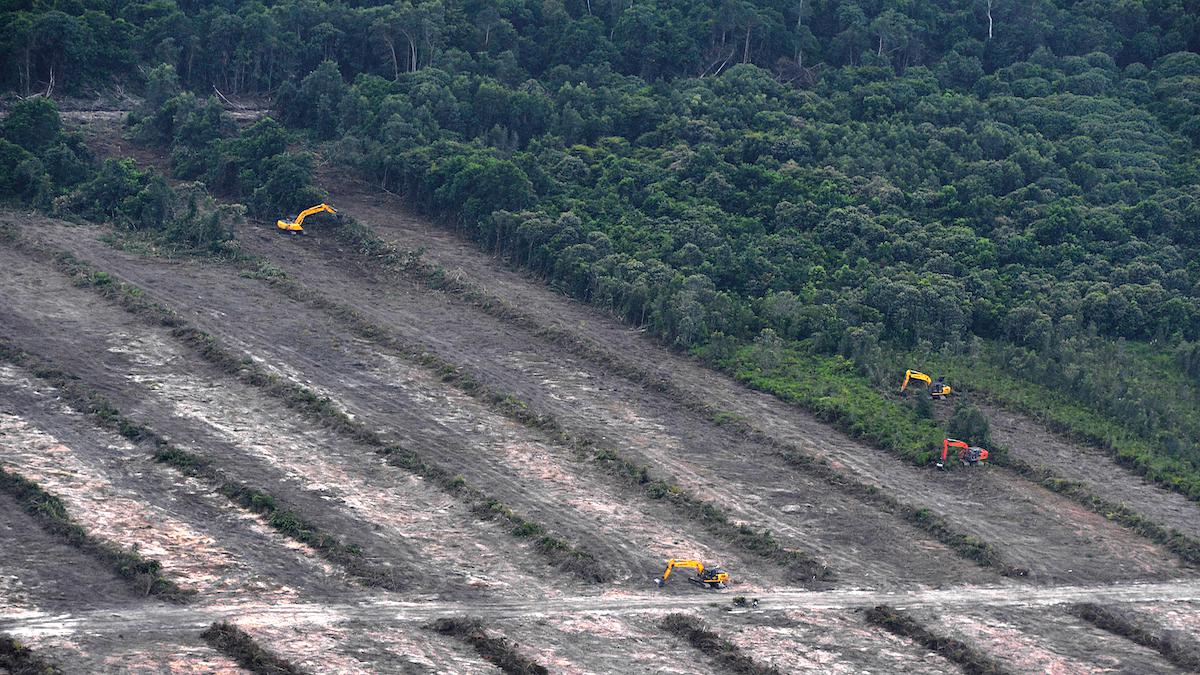
20% of Oil Palms Grown for Palm Oil in Indonesia Are Illegal, Report Finds

This photograph taken on Feb. 24, 2014 during an aerial survey mission by Greenpeace at East Kotawaringin district in Central Kalimantan province on Indonesia's Borneo island, shows deforestation for the development of a palm oil plantation. BAY ISMOYO / AFP via Getty Images
Growing palm oil is notoriously bad for the environment, as creating the oil palm plantations requires extensive deforestation. This process destroys the habitats of orangutans, Sumatran rhinos, tigers and many other creatures. Now, a report shows that about one-fifth of the oil palm plantations in Indonesia are actually grown in forest estates, including protected forests and conservation areas, that are supposed to be closed off from commercial agriculture.
The report, released by Greenpeace and TheTreeMap, outlines the extensive deforestation of designated rainforest areas in Indonesia. Researchers found that 3.12 million hectares — roughly the size of Belgium — of oil palms were being grown in these supposedly protected forests, including areas inside national parks, UNESCO World Heritage Sites, and Ramsar wetlands, a distinction meant to protect rare or unique wetlands.
The Indonesian government has already estimated 3.37 million hectares of oil palms are growing in forest estates, but Greenpeace’s new report, called Deceased Estate, also notes the companies that are doing the illegal growing of oil palms. The report describes the lack of enforcement of the law that is supposed to prevent companies from operating within these designated forest areas.
“There has been a catastrophic failure of law enforcement to protect the forest estate. Large oil palm plantation groups have not been prosecuted, while mill owners and palm oil traders have also gone unpunished, despite a law against dealing in commodities produced from illegal plantings within the forest estate,” the report states. “Instead, between 2012 and 2020, three increasingly lenient amnesties have been issued, providing companies with an opportunity for retrospective legalisation for their activity inside the forest estate.”
Even more concerning, the researchers found that even companies with Roundtable on Sustainable Palm Oil and Indonesian Sustainable Palm Oil certifications were growing about 283,000 hectares of illegal oil palms, putting so-called sustainable palm oil into question, too.
In addition to destroying protected forest estates and wildlife habitats, these plantations contribute about 104 million metric tons of carbon emissions per year. This equates to about 60% of global aviation emissions annually, according to Mongabay.
Further, over 8.6 million people live near these forest estates, and these local and Indigenous communities will experience worsening climate impacts as the deforestation continues.
Kiki Taufik, global head of Greenpeace’s Indonesian forests campaign, explained to Mongabay, “In areas where extensive forest clearance has been condoned, these landscapes are now subject to life-threatening heat waves, frequent flooding, and during the dry season moist forest cover is now prone to annual fires.”
Greenpeace and other environmental advocates are calling on the Indonesian government to start enforcing the laws against illegal palm oil plantations before it’s too late.
For its recommendations in the report, Greenpeace includes to “expose and end oligarchic influence on the Indonesian government,” end tax amnesties, “publicly release complete data on concessions including ownership, maps, plantation business permits (IUP), and land cultivation right (HGU),” restore forest estates and the companies’ expense, rapidly increase land mapping and to recognize and honor Indigenous rights.
“Greenpeace, along with many others, strongly believes that legal action should be taken by the central government against businesses operating illegally in the forest estate,” the report says.
- Major Brands Source Palm Oil From Illegal Plantation Inside ...
- Indonesian Journalists Critical of Illegal Palm Plantation Found ...
- New Player Begins Clearing Rainforest for World's Largest Palm Oil ...
- Palm Oil Company Ordered to Pay $30 Million for Illegal Rainforest ...

 233k
233k  41k
41k  Subscribe
Subscribe 